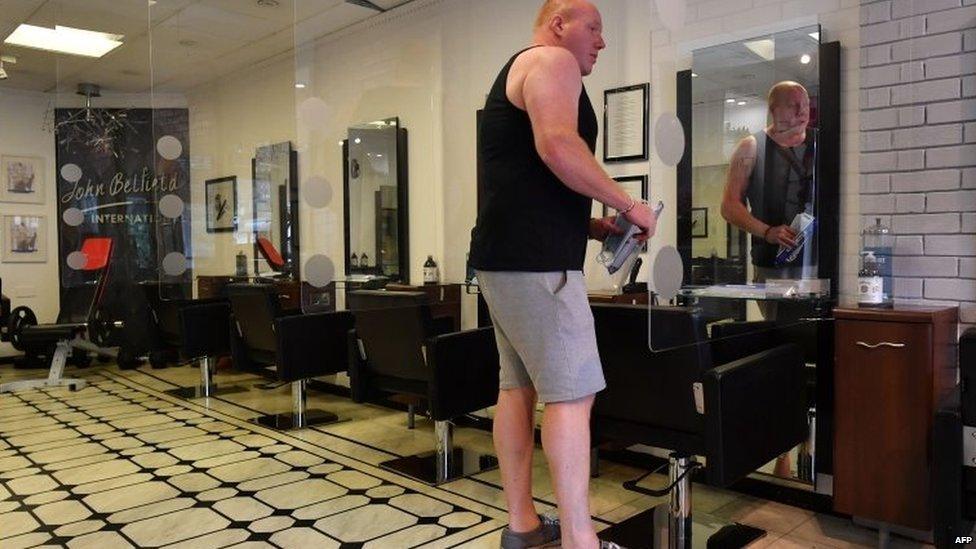Next stage in virus battle brings new challenges
- Published

Hairdresser John Belfield prepares his hair salon, with perspex screens in between customers' seats
Unless something very strange happens in the next few hours, on Tuesday the prime minister will officially confirm the next step in the government's plan for taking the country out of lockdown.
When the government outlined its strategy, July 4th was already named as the day when businesses in England who still had their doors closed would be able to start opening up again - hairdressers, pubs, hospitality and tourism - businesses that saw their livelihoods drain away while the nation stayed at home.
It was the third stage in a plan that was written many weeks ago now, and you can see here exactly how the proposals were presented, external.
And to give firms time to prepare, and to ease the political pressure he's under, Boris Johnson is expected to announce these changes on Tuesday.
But since Whitehall officials put that plan together, the decisions the prime minister will announce have started to take on a different meaning.
It's not been a surprise to Downing Street that the politics of this crisis have become bumpier as each day has gone by. As we've talked about here many times, ministers always believed managing the country out of lockdown would be more complicated, more fraught than the historic blanket decision of telling everyone to stay at home.
Frustration and fear
There is no set of regulations that could cover every human situation.
It was probably inevitable that unprecedented sky-high levels of public support for the government's actions would fray, and those numbers start to tumble.
Frustration has set in as well as fear of the disease and for the economy.
But many Tories are nervous that the problems the government has had in recent weeks are not just the natural consequence of a very serious policy puzzle, but the product of political mistakes and unforced errors by a government, and a prime minister perhaps not quite coping with the task.
There was a failure to swiftly spot the politics of providing free school meals during the holidays in England which led to a u-turn; abandoning the promise to get every child back into primary school before the summer; junking the effort for the government to build its own app to help monitor the virus as the country moves out of the emergency phase of the disease...among other missteps.
There has been a sense the government has been scrambling, rather than smoothly moving forward; lurching, rather than leading decisively each day.
The government has been scrambling for months to grapple with a challenge the like of which no British government has had to deal with.
Ministers point to what's been achieved - the enormous financial schemes that have supported millions of people, the expansion of NHS capacity that has stopped it falling over, and importantly the number of cases of the disease and infection rates have been in retreat.
But mistakes have been made that have given even many of Boris Johnson's backers cause for concern, worrying about his own ability to make rapid decisions.
One official suggest he's been conflicted on many issues because by nature he is "optimistic and a liberal and lockdowns are pessimistic and illiberal".
But politicians don't choose the times where they are in charge.
July 4th is where the existing roadmap ends, and in practice and politically, the beginning of the next chapter.
There's huge pressure on the prime minister to reset the route.

A SIMPLE GUIDE: How do I protect myself?
IMPACT: What the virus does to the body
RECOVERY: How long does it take?
LOCKDOWN: How can we lift restrictions?
ENDGAME: How do we get out of this mess?

